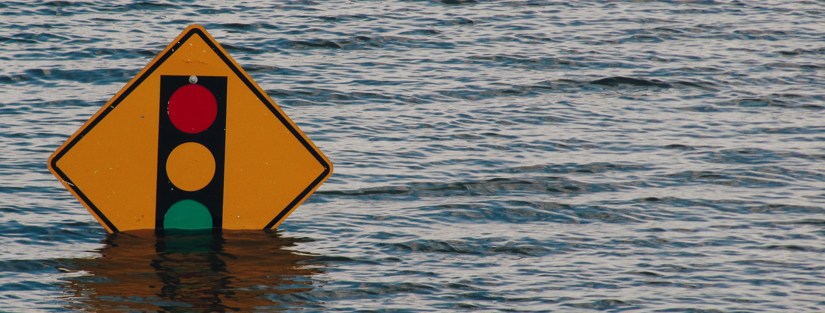Climate Change: The Next Educational Divide?
If climate change expands inequality, here’s how it may affect students.
Weather conditions seem to have taken an apocalyptic turn as a sequence of recent climate disasters have emphasized the need for urgent environmental action.
More than 85 people were killed in December 2021 by tornadoes that devastated western Kentucky; seven months later at the other end of the state the death toll from flooding approached 40 people. Europe is experiencing a record-breaking heatwave this summer that scientists estimate will become the norm by 2035. The McKinney wildfire in Northern California burned more than 55,000 acres of land as of the latest reports. The list, unfortunately, goes on.
As extreme weather increasingly impacts our lives, students — many already facing the digital divide and food insecurity — may be especially vulnerable and even put at an educational disadvantage.
Although they’re just one aspect of the climate crisis, high temperatures have a negative effect on learning. In a 2020 study published in Nature Human Behavior, researchers analyzed data from 12,000 U.S. school districts to determine the relationship between standardized student achievement, weather, and academic calendars. The results showed that learning rates decreased with an increase in temperature, underscoring one effect of climate change on educational achievement.

Heat waves also pose a threat to mental health. In a June 2021 press release, the American Psychiatric Association emphasized the connection between extreme heat and mental health, with side effects ranging from irritability and depression to an increase in suicide. This is particularly disturbing considering that mental health has a direct impact on academic performance, according to the Suicide Prevention Resource Center.
Climate change is also fueling mental health problems in children and young adults who are concerned about future catastrophes. In a 2021 survey of 16- to 25-year-olds across the globe, 60% of participants reported feeling very or extremely worried about climate change. Moreover, a staggering 45% of respondents said such feelings — dubbed “eco-anxiety” by researchers — impacted their daily lives.
In a 2022 Yale Climate Connections report, professors Jill Hopke and Barbara Willard of DePaul University urged educators to embrace the notion of climate hope after witnessing their students suffering from “eco-anxiety.” “While we need to be honest about the challenges of the climate crisis, we also must give students clear and honest direction about realistic solutions,” the authors wrote. “Sources of inspiration are essential in restoring a commitment to individual and collective action, and students must have hope for society’s collective capacity to act, and also hope in the gains to be made through effective advocacy.”
WIDENING THE GAP
Recognizing the impact of worsening heatwaves on mental as well as cardiovascular and respiratory health, the city of Vancouver will require builders to install mechanical air-conditioning equipment in all new multi-family homes starting in 2025.
But not all will be so lucky. The Fourth National Climate Assessment, completed in 2018, found that climate change will deepen inequalities. “People who are already vulnerable, including lower-income and other marginalized communities, have lower capacity to prepare for and cope with extreme weather and climate-related events and are expected to experience greater impacts,” according to the report. While floods in Kentucky, Mississippi, and elsewhere in the U.S. were occurring, in Pakistan, the fifth-most populated country on the planet where 40% of the population lives on about $3.20 a day, more than 1,000 have died during August flooding.
When researchers in the aforementioned 2020 study linking increased temperatures with decreased learning rates examined the effect on test score by race, they found that detrimental impacts disproportionally affected Black and Hispanic students. The paper’s head author, R. Jisung Park, said the fact that minority students are less likely to have air-conditioned homes and schools could have contributed to the gap.
A 2018 study published in the journal PLOS One and led by University of Washington researcher Ian Davie found that ethnic and racial minorities, in general, were more vulnerable to wildfires than primarily white communities, with Native Americans six times more likely to live in areas with high wildfire risk.
As a potent pollutant, wildfire smoke alone has forced universities to cancel outdoor activities, evacuate buildings, and cancel classes. Smoke shut down numerous universities on the West Coast of the U.S. between August and November of 2022, including the University of California–Irvine, University of Oregon, Washington State University, Oregon State University, Portland Community College, and Sonoma State University.
Wildfires are just one type of natural disaster causing closures. In March 2022, floods shuttered several major Australian universities as water gulped up students’ homes and possessions. Six months later, students across the globe at West Virginia University rallied to provide relief to victims of catastrophic flooding in nearby Eastern Kentucky.
RESEARCH
Evidence of the link between education and climate change continues to add up, but there’s far more work to be done. To that end, Bryan Alexander, adjunct professor at Georgetown University’s Graduate School of Arts & Sciences Department of Learning and Design, is due to release “Universities on Fire,” an examination of higher education in the age of global warming. The book will include a model of how higher education institutions could respond to the crisis.
Such resources are sorely needed: In a report prepared by the Higher Education Climate Adaptation Committee, authors Jennifer Andrews and Georges Dyer highlight the critical role higher education will play in responding to a changing climate.
“Higher education has taken a leadership role in climate mitigation — that is, preventing climate change by reducing greenhouse gas emissions,” the authors wrote. “It now must take the lead in climate adaptation — that is, preparing for and responding to impacts of climate change.”
The authors emphasized the need for additional research, “especially related to (a) very localized questions regarding specific ecosystems and (b) specific communities, especially in relation to the most vulnerable populations in our society.”

